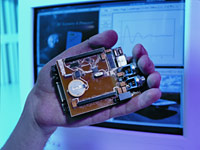| Computer Engineering - 3645 |
|
||||||||||||||||||||||||||||||||||||||||

Program Summary
The School of Computer Science and Engineering and the School of Electrical Engineering and Telecommunications have joint responsibility for the curriculum of the Computer Engineering program.
The staff of the School of Computer Science and Engineering are grouped into research groups of Architecture, Artificial Intelligence, Computer Systems, Database and Software Engineering. Courses in these areas are offered to students taking major studies in Computer Science or Computer Engineering, while introductory-level computing courses are available more generally to students studying Science, Arts or Engineering. Computer Science has links with discrete mathematics, which furnishes the theory behind the algorithms that computer software implements, and electrical engineering, which supplies the present technology underlying physical computing devices. Note Computer Engineering is also available as a component of the combined degree programs:
And as a concurrent program:
and as a fast track program:
For details of all academic requirements for this program, see http://www.eng.unsw.edu.au/rules/
Program Objectives and Learning Outcomes Please see http://www.eng.unsw.edu.au/rules/
The program structure below gives one sequence of courses that fulfils the requirements of the degree. The timing of the general education courses and elective courses may be modified to optimize the student's choice of courses. Suggestions for other course sequences consistent with timetabling and availability can be found on the School website at http://www.cse.unsw.edu.au or http://www.ee.unsw.edu.au . While some courses are offered twice a year, many courses are offered only once a year and students should plan their enrolments appropriately.
PLEASE NOTE:
Students should seek advice from their Program Director if they are unsure about what to enrol in.
Year 1 (Flexible)
Choose ONE of:
And ONE of:
And ONE of:
Plus the following 3 courses:
Plus choose 2 electives from the Year 1 Elective List
http://www.eng.unsw.edu.au/rules/elective.htm Suggested Year 1 electives for this program are:
Year 2 (Flexible)
And ONE of:
It is recommended that students start thinking about Industrial Training in the summer after Year 2 and Year 3. Graduation may be delayed if a satisfactory report for 60 days industrial training has not been received by the release of final year results.
For information relating to Years 3 and 4 of the flexible program structure please refer to the school website http://www.cse.unsw.edu.au/undegrad/programs/compb13645-flex.html
PROGRAM STRUCTURE FOR STUDENTS WHO ENROLLED PRIOR TO 2006 IS AS FOLLOWS:
For information relating to Years 1 and 2 of the program structure prior to 2006 please refer to the school website http://www.cse.unsw.edu.au/undergrad/programs/COMPB13645.html
Year 3 (pre-2006)
And One of:
Year 4 (pre-2006)
Elective Courses
1. The Program Director must approve the program selected by each student if it does not fall within the guidlnes set out for completion of the degree. Not all electives are offered in each session. Students are advised each year of the timetable of available electives. It may be possible to substitute other electives run by the participating schools, apart from those listed below, but this is not permitted if it unduly restricts the range of courses studied overall.
2. Electives for Stages 3 and 4 total 36 units of credit (6 courses of 6 units of credit, or equivalent) and are selected from Groups N, S, CE3, CE4, and D (see below), with these restrictions: i) At least 6 units of credit must be taken from Group N ii) At least 12 units of credit must be taken from Group CE4. iii) At most 12 units of credit may be counted from Group S. Group N Networks Electives
Group S Science Electives
Group CE3 Level-3 Computer Engineering Electives
Group CE4 Level-4 Computer Engineering Electives
General Education Requirements For a list of General Education Courses *NOT* available to Students in CSE, see http://www.cse.unsw.edu.au/undergrad/current/gened.html
Please see http://www.eng.unsw.edu.au/rules/
Please see http://www.eng.unsw.edu.au/rules/
For information regarding fees for UNSW programs, please refer to the following website: https://my.unsw.edu.au/student/fees/FeesMainPage.html
Please see
http://www.cse.unsw.edu.au/IT/ Engineers Australia
The professional body for engineering in Australia is Engineers Australia, which has as its first objective the promotion of the science and practice of engineering in all its branches. Engineers Australia has its national headquarters in Canberra and functions through a series of divisions, the local one being the Sydney Division. Within each division are branches representing the main interests within the profession, e.g. civil, mechanical, electrical, engineering management and environmental engineering. Students of an approved school of engineering may join the Institution as a student member (StudIEAust). Student members receive the monthly publication Engineers Australia and for a small fee they also receive The Transactions which contains articles on a particular branch of engineering. Student members are invited to participate in the Excellence Award for Work Experience, the National Young Engineer of the Year Award and to avail themselves of other Engineers Australia services including the Mentor Scheme and industrial experience guidance. For more information and membership application forms, contact Engineers Australia, Sydney Division, Level 3, 8 Thomas Street, CHATSWOOD NSW 2067 - telephone 02 9410 5600 www.engineersaustralia.org.au The Australian Computing Society The peak professional body for computing in Australia is the Australian Computing Society (ACS) - www.acs.org.au The objectives of the ACS can be found here and include: "advanc[ing] professional excellence in information and communications technology, and further[ing] the study, science and application of information and communications technology." Again, students who want to join ACS should go to Member Application Area(s) of Specialisation |
|||||||||||||||||||||||||||||||||||||||||

| Contacts | Library | myUNSW | WebCT |